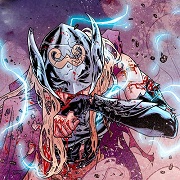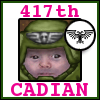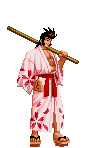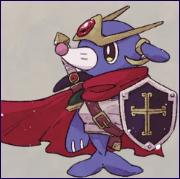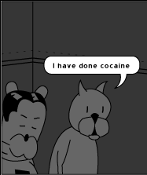|
Covok posted:I guess the other issue was that my Godbound game (outside one player having a busted microphone that ended up killing the entire game and, frankly, that was my fault) had trouble challenging the players. I would throw really insane poo poo at them like a Godbound turning an entire city they called home into a spiral mountain into the sky with a full dungeon inside and...the players would just try to find ways to circumvent the whole thing. Which, sure, I get it: that's my bad. But it also was just kind of hard to make challenges sometimes. I'd say one of the things to remember with really high powered games is that most of the traditional barriers (walls or distance), just don't work. You can't have a 'dungeon' scenario when players can casually walk in a straight line through a wall to get wherever they're going. It means that most of the traditional elements used to structure adventures or scenarios just aren't available, and attempts to use them often end badly.
|
|
|
|

|
| # ? May 25, 2024 17:58 |
|
oriongates posted:I'd say one of the things to remember with really high powered games is that most of the traditional barriers (walls or distance), just don't work. You can't have a 'dungeon' scenario when players can casually walk in a straight line through a wall to get wherever they're going. What you're saying is is that I have to think laterally. Like instead of being in a dungeon, putting them in The multi-dimensional Labyrinth from Gurren Lagann where the issue is more trying to escape your heart's desire and seeking reality over fantasy? In other words, I have to think bigger.
|
|
|
|
Jimbozig posted:For introducing beginners, I like to use the basic rules plus Tactical Combat, Chase, and Relationships. I add in Team Conflict and Duel (currently playtesting) later once they have tried a chase. If you like reputations, you can add those once they earn it. For enemies, just start with reskinning the standard monsters rather than trying to build your own until you are comfortable. oriongates posted:I'd say one of the things to remember with really high powered games is that most of the traditional barriers (walls or distance), just don't work. You can't have a 'dungeon' scenario when players can casually walk in a straight line through a wall to get wherever they're going.
|
|
|
|
Covok posted:What you're saying is is that I have to think laterally. Like instead of being in a dungeon, putting them in The multi-dimensional Labyrinth from Gurren Lagann where the issue is more trying to escape your heart's desire and seeking reality over fantasy? In other words, I have to think bigger. That can definitely work, but you also don't want to to just stick your players in a demiplane every scenario. In many cases it's more about breaking things up... In a dungeon you've got a series of rooms, connected by hallways and doorways. Some areas can be explored freely...when players come to a door they can choose to pass it by or open it, when they come to a hall they can choose to go left or right. But you can also set conditions or barriers that prevent progress until the players have tripped certain flags (getting the bone key from room B to enter the necromancer's crypt, pulling the three levers to open up level 2, etc). By and large a well-designed dungeon will have certain set-pieces that you know you want players to encounter, with other rooms there to provide connections or to work as a buffer and prevent things from wrapping up too quickly. You can take that same sort of philosophy and apply it to more free-form adventure design. Think of 'scenes' you want to happen and then treat them like rooms in a dungeon...instead of being separated by walls and hallways they're separated by time or knowledge. Some will require specific plot 'triggers' to unlock like keys to a locked room. That's not to say the process is identical, obviously players will have much more freedom to ignore or skip scenes, you'll find yourself having to come up with more things on the fly when players go off the 'edge of the map', metaphorically speaking. Often it helps to think in reverse of the standard design...dungeons are 'passive' encounters, waiting for players to explore them and generally remaining static and unchanging until the players reach the point. In these sort of games you want ongoing processes, events already in motion that progress on their own until the players intervene or react. The series of odd murders in town lead to the summoning of the demon, the summoning of the demon will allow the cult to raise the hellspire, raising the hellspire will allow them to devestate the kingdom's armies, devestating the kingdom's armies will allow them to lay waste to the land, this will summon the dark god. traditionally this would be the looming threat that causes players to act in order to prevent it. In something like Godbound, the players might intervene early and stop the madness...but if the dark god is summoned and the kingdom is ruined...that's not the end, the players may have hosed up, but the game isn't over. Basically, think less like a map, and more like a flowchart.
|
|
|
|
Covok posted:Also, I ran Godbound once, but we ran into a problem where combat got boring. My theory is because everyone was 1st level and its Basic D&D combat so they couldn't do a ton of cool poo poo before running out of Effort. But maybe you have some thoughts on it? I really feel like Godbound just recreated a lot of the problems with Exalted 2E, but-this-time-you-roll-a-d20
|
|
|
|
All this god talk makes me think y'all need to have a look at Nobilis.
|
|
|
|
oriongates posted:I'd say one of the things to remember with really high powered games is that most of the traditional barriers (walls or distance), just don't work. You can't have a 'dungeon' scenario when players can casually walk in a straight line through a wall to get wherever they're going. That happened to me in a Dungeon World game I was running (using fan-made classes, so it was my own fault). Thankfully, by the time it got that far, the game had become so over-the-top and crazy that I just sat back and enjoyed the ride. I think I've posted the whole story before in the cat piss thread, but one highlight is that the Necromancer stuffed a mountain-sized space dragon into a canopic jar after the party killed it (turns out there's explicitly no size limit!) and later summoned it as a zombie to tear the final dungeon in half.
|
|
|
|
Probably the wildest example of that happening to me was in my last Strike campaign where one of the PCs ended up becoming a dyson sphere.
|
|
|
|
Serf posted:Probably the wildest example of that happening to me was in my last Strike campaign where one of the PCs ended up becoming a dyson sphere. So excited to realize that they could reflavor whatever they want, that they didn't stop to think if they should reflavor whatever they want. DalaranJ fucked around with this message at 14:24 on May 11, 2018 |
|
|
|
Serf posted:Probably the wildest example of that happening to me was in my last Strike campaign where one of the PCs ended up becoming a dyson sphere. Well poo poo, now I need this story.
|
|
|
|
Covok posted:What you're saying is is that I have to think laterally. Like instead of being in a dungeon, putting them in The multi-dimensional Labyrinth from Gurren Lagann where the issue is more trying to escape your heart's desire and seeking reality over fantasy? In other words, I have to think bigger.
|
|
|
|
I think it's a matter of execution. If everything in the scenario is just a reskinned dungeon feature, there's little room to use powers creatively, and only one or two predetermined solutions to the adventure, that would indeed be bad. Edit: Thinking out loud here: I find that the factions that often appear in post-scarcity or transdimensional games are rarely satisfying to me. Little about Planescape's factions strikes a chord with me. Why not just transplant actual, relatable beliefs into a setting where everybody knows for certain how heaven and hell are organized, and so on? Even Eclipse Phase has some factions that are like "I'm a pick an idea and just do that as hard as I can." Sufficiently Advanced has some neat factions but the premise of the game is working for a post-scarcity intellectual property law bureau so hard pass. Halloween Jack fucked around with this message at 15:34 on May 11, 2018 |
|
|
|
So, just thinking about supers games since it was mentioned... Is there a point to having the ability to buy super-strength by itself? Separate from some form of super-toughness? Can anyone think of legitimately superstrong character in fiction (not merely superhuman, like at least 'throwing cars' level) who does not possess at least equivalent super-toughness? Other than obvious joke characters who are designed to be useless for humor value. Obviously there are characters who are super-tough without being superstrong, or whose toughness exceeds their strength (although even then that's relatively rare), so it makes sense to have superhuman defenses available to purchase separately, but it seems like superstrength should come with some level of supertoughness by default. There are a small number of exceptions in manga/anime, characters whose powers take tremendous tolls on their body (Midoriya from MHA is the most obvious example) but these are almost exclusively a 'cost' associated with the character using their abilities, while the characters can typically tank massive amounts of damage from opponents (example, in a recent episode of MHA, Midoriya breaks his arm punching his opponent, but is still up and running after the opponent smacks him so hard into the ground he leaves a 1-2 foot deep crater). So, game-design wise these would be better represented as an attack power that takes vitality or energy to use rather than a persistent ability like X levels of superstrength. Midoriya's arm breaker attacks aren't super-strength, they're more like energy blasts 'refluffed' as physical power. Examples aside, I mainly wonder about this when balancing powers like speedsters vs bricks. Super-speed, as a power, is useful for both attack and defense in almost all systems (where it isn't completely broken to start with), while a character trying to be a 'brick' has to buy their attack and defense abilities separately. It seems like it might be easier to balance simply to have a power like 'Might', which covers both strength and durability, with the option to purchase dedicated defenses (forcefields, ring of invulnerability, etc) as a separate, and more powerful, defensive ability.
|
|
|
|
I think a problem with power balancing is that in the medium you're trying to emulate it's basically "as tough or strong as the narrative requires right now" but also "able to be incapacitated or neutralised when required"
|
|
|
|
Basically all super heroes are super-tough to one degree or another. They all have to be able to take hits from enemies of the appropriate tier.
|
|
|
|
Not untrue, but at the same time I feel like it's important to at least provide the mechanical illusion that gameplay is different for someone who's fast on their feet and someone who was bitten by a radioactive Nokia 3310
|
|
|
|
I mean Deku has high tech superhero armor and stuff that helps
|
|
|
|
Yeah there's a difference between "spiderman crawls out of the wreckage he just got punched into from a block away and makes a joke about it" and "villain punches hulk in the chest, hulk doesn't budge and the villain quips that he hurt his hand". Both are durable to a superhuman extent but one is characterized by his durability (in this instance, anyway). The question then becomes how you make the latter interesting mechanically
|
|
|
|
Countblanc posted:Yeah there's a difference between "spiderman crawls out of the wreckage he just got punched into from a block away and makes a joke about it" and "villain punches hulk in the chest, hulk doesn't budge and the villain quips that he hurt his hand". Both are durable to a superhuman extent but one is characterized by his durability (in this instance, anyway). I mean, that depends on what the mechanics cover, right? What number or tag changed on Spidey's sheet when that happened? What on Hulk's sheet? Both of them are still in the fight.
|
|
|
|
Almost as if trying to create some overarching grand mechanical engine to simulate super hero comics as if they were real life events is pointless and futile! Seriously, simulationist engines will always fail.
|
|
|
|
Well, arguably, if spiderman took a hit then he failed in his defense (since he's a mobility focused character), he might have a certain amount of durability to mitigate the damage (or just more boxes to fill), but if he's been punched through a wall something has gone wrong for him. If Hulk gets punched through a wall...that might mean nothing at all to him. He may have just tripped. There's several ways that it could be represented mechanically...Savage Worlds would give Hulk bigger Toughness while Spiderman probably inflicts a penalty to his opponent's fighting or shooting roll (along with higher-than-human toughness). This means the "perfect opponent" for each is opposite for both...spiderman has to worry about extremely skilled opponents who can manage to land a blow despite the penalties (or opponents who can spam tons of attacks until the dice come up in their favor). It means normal weapons like guns or swords can still hurt him if his opponent manages to land a blow. Those same opponents would be minimal threats to Hulk since his huge toughness means that it would take very high damage attacks to faze him (and even then they're probably soaked), hulk has to worry about the opponents who probably have average or medoicre Fighting scores, but have bought up damage dealing powers to the degree that they can casually bust through his high Toughness. Those high-damage opponents are less of a threat to spiderman since they likely can't touch him and all the damage in the world is useless if you can't land the blow. Not that I would suggest Savage Worlds for supers on the scale of spiderman or hulk, but it's a good example of how a system can emphasize certain traits in different ways, even if the ultimate goal is "don't get hurt".
|
|
|
|
starkebn posted:I think a problem with power balancing is that in the medium you're trying to emulate it's basically "as tough or strong as the narrative requires right now" but also "able to be incapacitated or neutralised when required"
|
|
|
|
ProfessorCirno posted:Almost as if trying to create some overarching grand mechanical engine to simulate super hero comics as if they were real life events is pointless and futile! There's nothing wrong with having a lot of technical rules in a superhero game, so long as everyone understands that you have to either stick to street-level heroes, or exalted-level heroes and not mix the groups. The problem is everyone wants to run an Avengers/Justice League game and those rosters always have someone like Hawkeye rub elbows with Thor. That can work in a game with more abstracted expressions of super powers, like MHR or Masks, but the minute you start trying to apply all sorts of definite numbers to stats and bonuses to damage the normal characters can't keep up.
|
|
|
|
There's also the issue that the "team normal" in something like Justice League just isn't the same character as they are in their solo book. Batman in his own comics is a fairly down to earth brawler and investigator with a few useful tricks and gadgets, justice league batman is a super-gadgeteer just like Reed Richards or Tony Stark.
|
|
|
|
One of the big name members of the Legion of Superheroes, Ultra-Boy, had all of Superman's powers...but could only use them one at a time. Which included a choice Super Strength or being invulnerable. (I'm also pretty sure trying to emulate him is where Champion's Multipower came from.)
|
|
|
|
oriongates posted:So, just thinking about supers games since it was mentioned... Jessica Jones? (I'm actually still bitter cause I was hoping they'd make her super strong but not super tough and Luke Crane invincible but just really-buff-dude levels of strong and work the juxtaposition. Thanks, Netflix.)
|
|
|
|
Xiahou Dun posted:Jessica Jones? Not an expert in Jessica Jones, but from some quick research I'd say she's probably as tough as she is strong. She's about the same level of strength as spiderman (maybe a bit lower) and both display feats of super-toughness, even if that isn't so tough that they would be bulletproof. They could both probably take a hit from their clone and not end up wiped out. (Luke Cage on the other hand is probably a good example of a character who is tougher than they are strong, even if he is pretty strong).
|
|
|
|
oriongates posted:Not an expert in Jessica Jones, but from some quick research I'd say she's probably as tough as she is strong. She's about the same level of strength as spiderman (maybe a bit lower) and both display feats of super-toughness, even if that isn't so tough that they would be bulletproof. They could both probably take a hit from their clone and not end up wiped out. From the show.
|
|
|
|
in my superhero rpg just you win the adventure in the first 20 minutes and then argue which one of you would totally win in a fight for the remainder of your 6 hour session
|
|
|
|
Actually thought of a decent example myself, ironically it's Invincible. Viltrumites seem to be represented as significantly stronger than their own durability, often killing one another in just a punch or two.
|
|
|
|
My group often plays (or at least used to play) homebrews where characters tended to be absurdly powerful and we managed to make it work in a few different ways. One solution, in a comedic game, was to just accept that there was a certain material that we couldn't affect in any way as a conceit of the setting, and important dungeon walls tended to be made of it. In a more serious game that would feel out of place though. Another solution, in a really really high powered system, was just accepting that there was no obstacle I could throw at them that couldn't be solved with a single narrative action. In those situations, rather than a series of small obstacles, I switched to using broad, open-ended problems that let the players get creative because of the lack of obvious ways to even interact with it.
|
|
|
|
Jimbozig posted:Basically all super heroes are super-tough to one degree or another. They all have to be able to take hits from enemies of the appropriate tier. Exactly, heck I'm tempted to just have it be a default assumption in at least one Superhero setting I'm tinkering with, that if you have an active Meta Gene(which for this setting would be the only way to have powers, and non powered Heroes would basically be nonexistent) then no matter whatever other abilities you have you also have at least enough durability that most mundane firearms will at the most give you some bruises, and enough super strength to lift a small car Nuns with Guns posted:There's nothing wrong with having a lot of technical rules in a superhero game, so long as everyone understands that you have to either stick to street-level heroes, or exalted-level heroes and not mix the groups. The problem is everyone wants to run an Avengers/Justice League game and those rosters always have someone like Hawkeye rub elbows with Thor. That can work in a game with more abstracted expressions of super powers, like MHR or Masks, but the minute you start trying to apply all sorts of definite numbers to stats and bonuses to damage the normal characters can't keep up. When it comes to Superheroes and RPG's what I feel the sweet spot in terms of power levels are that covered by the top tier Street heroes like Luke Cage, Iron Fist, or Spider-Man, and that of most X-Men(besides those like Magneto or Phoenix), and the lower to mid tier Avengers members(so not your Thor or Sentry tier characters, but more like Giant Man or Captain America) Basically the power level is high enough that your average bank robber or henchman isn't much of a threat at all in a straight fight, but not so high that a lucky shot couldn't result in grievous injury, or that being massively outnumbered wouldn't result in capture
|
|
|
|
cheetah7071 posted:Another solution, in a really really high powered system, was just accepting that there was no obstacle I could throw at them that couldn't be solved with a single narrative action. In those situations, rather than a series of small obstacles, I switched to using broad, open-ended problems that let the players get creative because of the lack of obvious ways to even interact with it.
|
|
|
|
Getsuya posted:Now we just need someone to run it. Itís tragic how few GSS games have been run around here. I think thereís only been 3 ever? Nah, there's been at least twice that, they just tend to die early and often. GSS is ironically, a game that requires a lot of work on both the GM and player side, you have to be willing to be proactive and engage with other players and PCs. It's not a game where the GM can do all the work like in a lot of others; it'll fall flat if you're expecting a chain of pregenerated encounters to just chew your way through like most mission-oriented games. And given PbP games often get strangled by one or two players falling behind, it's not surprising it's been a tough time with them. unseenlibrarian posted:One of the big name members of the Legion of Superheroes, Ultra-Boy, had all of Superman's powers...but could only use them one at a time. Which included a choice Super Strength or being invulnerable. Yeah, a classic moment of peril for him would be to have him lift something vital and then get menaced, knowing he couldn't turn on his invulnerability without dropping an important thing. Legion of Super-Heroes is kind of a weird outlier in general, though, given you have a lot of Silver Age characters with dubious powers (Triplicate Girl, Matter-Eater Lad, Bouncing Boy). When Librarian and I ran Mutants & Masterminds with other folks, we learned to enforce characters having roughly the same toughness levels no matter what. The justification was different at times - some characters might be tough, have force fields, or are just really good with a punch - but generally the same outside of certain situations. People would come in from other RPGs and give themselves a "logical" or "realistic" amount of toughness, and we had to actually force people to give themselves that maximum toughness available (ditto for saving throws, attack bonuses, and damage). Because otherwise you just get one-punched, and no matter how much you say you're fine with that up-front, it isn't actually fun and you're likely going to regret it. But it's kind of surprising how much you have to break people of self-shaming and trying to "not be cheesy" even though the system has limits that keep you from doing that in the first place.
|
|
|
|
Matter-Eater Lad is great because being able to eat literally anything is occasionally hilariously useful.oriongates posted:There's also the issue that the "team normal" in something like Justice League just isn't the same character as they are in their solo book. Batman in his own comics is a fairly down to earth brawler and investigator with a few useful tricks and gadgets, justice league batman is a super-gadgeteer just like Reed Richards or Tony Stark. I figure in at least some cases like that, you could argue that Batman patrolling around Gotham is relatively lightly equipped, while Batman called up to the League brings his A-game and most expensive toys to the party. The Arkham games even have him established as only carrying a few of his gadgets and equipment, and calling in drops of other stuff (and even acquiring and building gadgets in the field) as needed. And the show was pretty good at showing how Batman couldn't dish out hurt like the other heroes in raw power or extranormal abilities, he mostly acted as a fly in the ointment at the best times, using cunning, analysis, psychological warfare and hitting them in the soft bits. (as well as paying for everyone's stuff) In short, he has to change his tactics and thinking when working with the League, and it can be assumed most similar characters do too. I figure a superhero game should be strongly narratively focused, but with enough detail to make the nature of the characters matter; a character defined by super-strength or speed or weaving or whatever is assumed to have any and all secondary abilities required to make use of it, but they're otherwise not notable enough to come into play mechanically (unless there's a good justification for it, maybe) unless you've specifically chosen to have super-durability or the ability to produce an unlimited amount of straw at will. Invulnerability can be a fun power especially if you play up the party tank angle. Justice League iirc had Superman taking a lot of hits specifically because he made sure to always be in front because he can take it more than anyone else.
|
|
|
|
The general baseline superhuman toughness everyone in superhero fiction has is just standard fiction rules. Concussions don't exist. Oxygen is like batteries, running out is fine as long as someone shoves more into you later. Your shoulder is an amorphous slab of bullet-absorbing meat with no moving parts. Trying to emulate that by making everyone super tough is missing the point, it's just a genre convention that humans are immortal up to the point when they're suddenly not. The reason superheroes never get headshot is because death is not an interesting fail state. "How will Batman get out of this one?" is the assumption, the question is whether he's going to do something clever and gain something from the situation, or barely pull through and lose something from the situation. A good superhero game would need to model this. Superheroes don't die except for dramatic self sacrifice or to end gravitas to a situation. Running out of HP or whatever the death equivalent is instead means you pick what it costs you to live. Do you lose your powers? A loved one? Fail to save the city? Of course Spiderman is going to crawl out of the rubble, the question is will he crawl out in time? In something like this Invulnerability isn't the power of soaking damage, it's the power of soaking consequences. When The Thing says it's clobbering time it's not just time for him to do the clobbering, it's time for the bad guy to try to clobber him. So if you pick Super Strength then you get Super Toughness as part of the package, unless you're explicitly trying to play Glass Jaw Man. But if you're explicitly playing Invulnerable Man you also get the stuff that makes being invulnerable an active rather than passive ability. Like forcing enemies to attack you, taking the ceiling that was going to fall on your friend, the stuff that lets your friends stay in the fight. Because in superhero team ups that's what being invulnerable is for. Splicer fucked around with this message at 14:24 on May 12, 2018 |
|
|
|
I kinda wish there was a way for systems to emulate well stuff like Nen Powers/Stands/Devil Fruits in a way that lets player use them creatively and think out of the box but there hasn't been many successes on that matter
|
|
|
|
You want to really throw a system into knots, trying and create a mechanical resolution for Stands. Regarding creative use of powers, I think Truth and Justice manages a decent method with it's stunts (it's got some balance issues, but the heart of the idea is fine), basically letting you morph one power into any other power so long as you can provide a relation. So say a forcefield user could create a suit of force-field power armor for a strength boost, or razor-thin fields for an attack power, that sort of thing. But of course, things like Stands are kind of like playing calvinball until one of you explodes or dies messily.
|
|
|
|
I feel like a good number of shonen battles - at least in better series like Jojo's Bizarre Adventure or One Piece - are kind of more like puzzle challenges than straightforward fights. The hero has to work out how best to leverage their own powers creatively to beat a foe that is likely unbeatable in a straightforward fight. Though that's not always the case, of course, sometimes there's a secondary element or dilemma that keeps the hero from just throwing out whatever their Big Attack is, like a hostage or a promise they made or they've been debuffed somehow. I'm not sure there's a system that really does that well yet, through I know folks have certainly considered it. You don't see it as often in western comics, but there are some like Spider-Man, who would have his villain-of-the-month with some quirky power back in the Silver Age and Spidey has to figure out how to beat an electrified foe or a foe made of sand or whatever with just his ingenuity and web-slingers.
|
|
|
|

|
| # ? May 25, 2024 17:58 |
|
Or the villain is just very silly like the White Rabbit.
|
|
|







